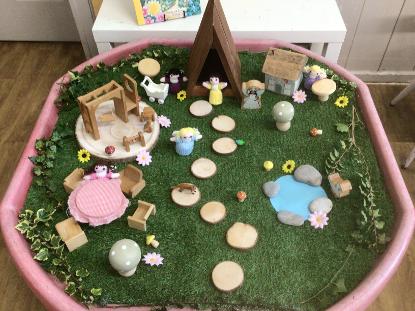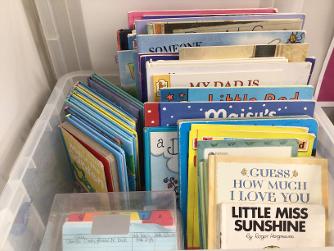Combe Pre-school follows the new Department of Educations non-statutory Curriculum Guidance for the Early Years Foundation Stage from birth to the reception year at primary school.
The 4 main Overarching Principles of the Early Years Foundation Stage which we endorse at Combe are:
A Unique Child: Every child is a competent learner from birth who can be resilient, capable, confident and self-assured.
Positive Relationships: Children learn to be strong and independent from a base of loving and secure relationships with Parents and/or a Key person.
Enabling Environment: The environment plays a key role in supporting and extending children’s development and learning, and responds to their individul interests and needs. Children develop well from teaching and support form adults and key persons, and from the development of strong partnerships with practitioners, parents and carers.
Learning and Development: Children develop and learn in different ways and a different rates and all areas of learning and development are equally important and interconnected . The education and care of all early years children is vital, including children who have special educational needs and disabilities.

Within the group, all children are supported in developing their potential at their own pace. Our keyperson system enables us to ensure a planned curriculum tailored to the needs of each individual child. By means of developmentally appropriate play activities and a high level of individual adult input, we offer a curriculum which enables children to progress towards the early learning goals throughout the Foundation Stage and prepares them for the National Curriculum, which begins at Year 1 in primary school.
The Early Years Foundation Stage is made up of 7 areas of learning and development. All areas of learning and development are connected to one another and are equally important. All areas of learning and development are underpinned by the Principles of the Foundation Stage.
We use a planning system called ‘In the moment planning.’ Each week the staff chose three focus children to follow over the week, where we take photographs and write observations which we place on an individual planning sheet. The following week, the staff will send a photograph of this sheet through our Class Dojo Communication App for parents to read at their leisure and gives them the opportunity to see a snap shot of what their children are learning during their time with us. These sheets will then be added into your child’s ‘Learning Journey’ file which we use to track your child’s progress.
We believe that good attendance at Pre-school promotes good outcomes for children.
The benefits are as follows:
· Your child makes friends and learns new social skills,
· Helps promote and develop good habits for school and future studies,
· Your child plays, learns and has fun,
· Your child will develop in all areas of learning.
If your child is absent for any reason, please contact the staff via email or phone to let them know. If you do not inform pre-school of your child’s absence, then a member of staff will contact you via the phone to ask you why your child is absent. This is in line with our Absence Procedures which you can view on our documents page on our website.
GDPR
From 25th May 2018, the General Data Protection Regulation (GDPR) replaced The Data Protection 1998.This change will stay in place after the UK leaves the EU in 2019. The GDPR gives individuals greater control over their own personal data and changes the way we use your data, ensuring that we keep it safe and secure at all times. In order to ensure our compliance, we will endeavour to keep all personal and sensitive information regarding our parents and children safe and secure. Our Privacy Notice can be downloaded and viewed below.

|
Combe Pre-school and After-school Club Privacy Notice 2021 to 2022.doc Size : 297.5 Kb Type : doc |
Safeguarding
We are committed to building a 'culture of safety' in which the children in our care are protected from abuse and harm. Any suspicions of abuse is promptly and appropriately responded to. We comply with local and national child protection procedures and ensure that all staff are appropriately trained. For more details see our Safeguarding Children and Child Protection Policy.

|
Early-help-guide-for-families-Sept-2023.pdf Size : 495.112 Kb Type : pdf |
Prevent Duty
Our setting complies with The Government's Prevent Duty to help prevent children being drawn into extremism. Our staff are vigilant and are required to inform our designated safeguarding leads, who will contact the relevant agencies if they suspect children are being exposed to extremism. Protecting children from extremism forms part of our settings safeguarding procedures and is an Ofsted requirement.
British Values
We actively teach British Values in our setting which means providing a curriculum which 'actively promotes the fundamental British Values of democracy, the rule of law, individual liberty, and mutual respect and tolerance of those with different faiths and beliefs'.
To do this Practitioners will:
- Listen to children,
- Share appropriate information with parents,
- Listen to parents,
- Reports concerns,
- Challenge negative behaviour,
- Focus on what children need,
- Support children's Personal, Social and Emotional development by helping children to develop a positive sense of themselves, and others, to form positive relationships and develop respect for others: to develop social skills and learn how to manage their feelings; to understand appropriate behaviour in groups; and to have confidence in their own abilities.
Inclusion, Equality & Diversity
Our setting believes that no child or family should be excluded from Pre-school activities on the grounds of gender, ability / disability, race, religion or cultural beliefs. We aim to ensure that all those who work in, or wish to volunteer to help with our Pre-school have an equal chance to do so. Our full Promoting Inclusion, equality and valuing diversity policy can be found on our documents page on our website.
Special Educational Needs
We aim to provide equality of opportunity for all members of our group, and this includes children with special educational needs. The number of adults present in the pre-school enables us to provide individual attention for each child. Each child is able to progress at her/his own rate in all areas of development, and this is true for children with and without disabilities or learning difficulties. We are trained to work in close liaison with professionals across the range of special needs, and we operate in accordance with the government’s Code of Practice on special educational needs. If you would like to discuss the group's ability to meet your own child's special needs, please talk to the pre-school leader or your child's keyworker. Our full Identification, assessment and support for children with SEND procedures document is available on our policies page on our website.
We use a digital system called Class Dojo to assist in helping us with Parent and Staff communication, for our Pre-school and After-school Club. This is a simple, free, easy to use system of sending photos and messages securely to Parents, either individually or as a group. This system has already been used successfully by the Primary school, and Parents with older children at the school can access the messages on the same app. Parents will be invited to download the app to their phone or device.
This system is well liked by the Parents at school, and we hope you will find it informative and a good addition to our provision. However, it will never replace the contact between keyperson and families, so please remember you are always welcome, and encouraged, to speak with your keyperson about your child.

RISING 5's Activities
Each year we offer rising 5's activities which is focused on easing the transition of children from Pre-School to Primary School.
Our Aims & Objectives
- To practice self care skills such as dressing and undressing for physical education, taking self to toilet and being able to manage hygiene skills required, putting own shoes and coats on and off and managing to open own lunch boxes and food containers
- Stories to positively reinforce school
- Practice name writing using variety of writing material and hopefully learn to write first name without name cards.
- Reading books and book bags - Each week children can choose a different story book to take home and share with their family. Picture book will also be included.
- Improve concentration & listening skills through table top games and puzzles
- Promote phonological awareness through listening and talking during activities, games and reading stories.
- Rhyming Games and songs,
- Physical Education and movement sessions
- More complex art activities
We also encourage feedback and input from parents on our objectives and aims.